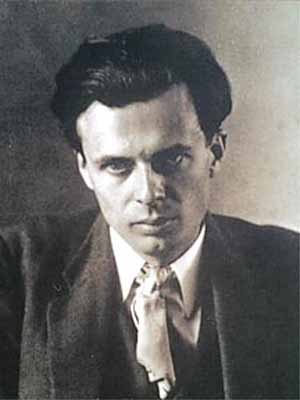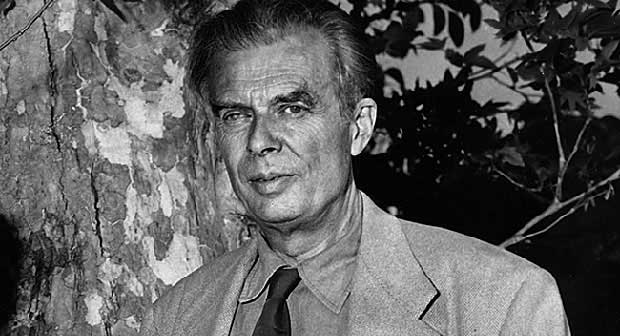Aldous Huxley on Overpopulation
Published on December 28th, 2015
Brave New World author warned of threat in 1958
 |
| Aldous Huxley (1894-1963) as a young man. |
Aldous Huxley (1894-1963) is most remembered as the author of the haunting, dystopian novel Brave New World, published back in 1931. This iconic work is one of the two most recognized (and unheeded) “cautionary tales” of the 20th century, the other of course being George Orwell’s Nineteen Eighty-Four.
Huxley was a public intellectual, philosopher, writer, novelist, Hollywood screenwriter and eminent member of the renowned Huxley family. He was the brother of Sir Julian Huxley and the grandson of Thomas Henry Huxley, famously dubbed “Darwin’s Bulldog” for his tenacious defense of Charles Darwin’s theory of evolution by natural selection. The diffident Darwin himself largely avoided the fray – which incredibly, lasts till this very day – unleashed by the 1859 publication of his magnum opus On the Origin of Species.
Aldous Huxley was an Englishman, but he moved to America in 1937 and spent the last two and a half decades of his life as a resident of southern California, and for a time, Taos, New Mexico. He died in Los Angeles in 1963.
In May 1958, Huxley was interviewed by broadcast journalist Mike Wallace (1918-2012), who later went on to make a name for himself as one of the hosts of CBS’s popular weekly news show 60 Minutes. Wallace introduced his guest as follows: “This is Aldous Huxley, a man haunted by a vision of hell on earth, a searing social critic….”
 |
| Huxley in his later years. |
Wallace asked Huxley: “Who and what are the enemies of freedom here in the United States?”
Huxley replied that he thought there were “a number of impersonal forces which are pushing in the direction of less and less freedom.” He added there were two main ones. The first of these:
“…is the force which in general terms can be called overpopulation, the mounting pressure of population pressing upon existing resources. This of course is an extraordinary thing. Something is happening which has never happened in the world’s history before. I mean let’s just take a simple fact, that since the time of the birth of Christ and the landing of the Mayflower [about 1,600 years], the population of the earth doubled. It rose from 250 million to probably 500 million."
“Today, the population of the earth is rising at such a rate that it will double in half a century [a rate of growth 30 times faster than that which resulted in the earlier 1,600-year doubling in size].”
Huxley then mentioned how rapid population growth could lead to less food and fewer economic goods per capita. A precarious economy in turn might trigger social unrest and instability, which could be exploited by communists, a concern that was widely shared in the West in 1958, during the nadir of the Cold War.
Today, while the threat of communism has receded, the threat of radical Islam and violent jihad are ascendant, and they too flourish in failing or failed states such as Syria, Libya, Somalia, Nigeria, Mali, Afghanistan and Pakistan. Almost all failing states in the world today are characterized by very rapid population growth and burgeoning numbers of unemployed, alienated, disillusioned and desperate young men. These millions are fodder for charismatic, hate-filled Salafist or Wahhabi demagogues and putty in the hands of terrorists with petro-dollars.
Back in 1958, Wallace then said to Huxley:
“Ironically enough, one of the greatest forces against communism in the world, the Catholic Church, according to your thesis, would seem to be pushing us directly into the hands of the communists because they are against birth control.”
To which Huxley replied:
“Well, I think this strange paradox probably is true. It’s an extraordinary situation actually.
“I mean, one has to look at it of course from a biological point of view. The whole essence of biological life on earth is a question of balance. And what we have done is to practice death control in a most intensive manner without balancing this with birth control at the other end. Consequently, the birth rates remain as high as they were and death rates have fallen substantially.”
 More than half a century has elapsed since this interview between one of the 20th century’s most celebrated newsmen and one of its most celebrated intellectuals. The world’s population was then less than half – a bit under 3 billion – what it is today – 7.3 billion – and the annual growth increment was less than it is today. In other words, 1) there are more than twice as many humans alive as when Huxley and Wallace uttered these words, and 2) every day, week, month and year more humans continue to be added than were being added back then.
More than half a century has elapsed since this interview between one of the 20th century’s most celebrated newsmen and one of its most celebrated intellectuals. The world’s population was then less than half – a bit under 3 billion – what it is today – 7.3 billion – and the annual growth increment was less than it is today. In other words, 1) there are more than twice as many humans alive as when Huxley and Wallace uttered these words, and 2) every day, week, month and year more humans continue to be added than were being added back then.
It is an utterly alarming, unsustainable state of affairs, yet population issues today largely elicit yawns or condemnation rather than urgent concern. There is more overt denial and greater apathy about the population issue today than half a century ago. What gives?
Perhaps the parables of the little boy who cried “Wolf!” and the chicken (Henny Penny or Chicken Little) who shouted “The sky is falling! The sky is falling!” have a bearing on our predicament. In trying to attract attention, generate concern and instigate action, prominent population activists over the past half century made all sorts of claims, some of which we can admit, in retrospect, were exaggerated, alarmist or even outlandish.
Needless to say, the more sensational and calamitous predictions have not come to pass, at least not yet, and this has produced widespread skepticism in many quarters that there is any “population problem” at all.
A host of other factors also have a bearing on our current sorry state – the often long lag times between causes and effects in geophysical and ecological phenomena (climate change is a prime example); the backlash against birth control, family planning and abortion by religious and patriarchal special interests; the mendacious and malicious claims by some feminists, leftists and ethnic groups that concern about population is fundamentally motivated by racism, classism, bigotry and xenophobia; and so forth.
 In the diagram depicting environmental carrying capacity and the human population growth trajectory, humanity is still somewhere on the upward slope of the curve, within the “overshoot” zone. That’s why population deniers – the practitioners of magical thinking par excellence – can continue to gloat that nature imposes no limits to growth that human ingenuity, positive thinking, the free market and technological innovation can’t overcome.
In the diagram depicting environmental carrying capacity and the human population growth trajectory, humanity is still somewhere on the upward slope of the curve, within the “overshoot” zone. That’s why population deniers – the practitioners of magical thinking par excellence – can continue to gloat that nature imposes no limits to growth that human ingenuity, positive thinking, the free market and technological innovation can’t overcome.
But we are depleting natural capital at an accelerating rate; we are degrading carrying capacity, and if we don’t humanely stop and then reverse population growth, a “crash” surely awaits us, that is to say, a highly inhumane, uncontrolled collapse of population.
In essence, because we have yet to tame or slay the “population monster” (a term used by Nobel Peace Prize Laureate Norman Borlaug, father of the “Green Revolution”), it may yet slay us instead.
More than half a century ago, visionaries like Aldous Huxley were warning humanity of the dire future that awaited us if the scourge of overpopulation (as Dr. Martin Luther King called it), were to continue unchecked. While some progress has been made, and some awareness created, overall our species continues to rush headlong and heedless toward the cliff that lies ahead.




